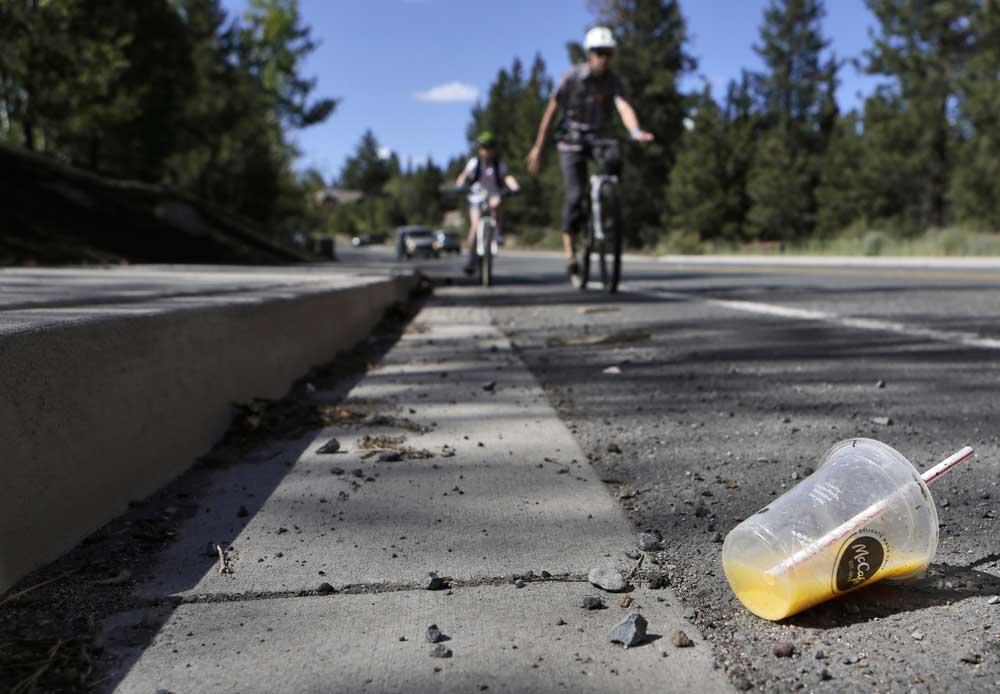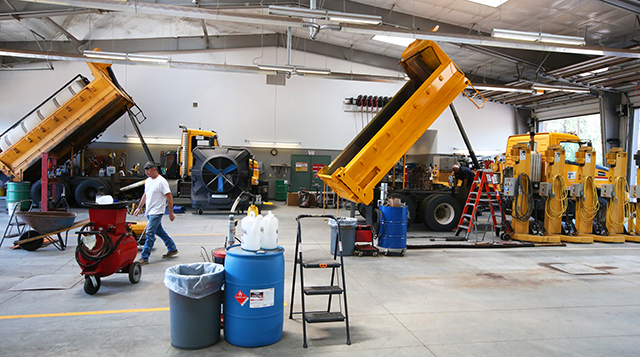Bend cyclists say bike lanes have become an obstacle course
Published 12:00 am Wednesday, May 23, 2018

- Cyclists prepare to dodge trash along NW Mt. Washington Drive on Tuesday in Bend. (Joe Kline/Bulletin photo)
As weather warms up, more Bend residents and visitors are hopping on bikes to pedal around town. But in many cases, they find bike lanes blocked by pine cones, broken glass and a winter’s worth of sanding rocks and cinders.
“It’s like an obstacle course and you have to chart the safest and best path,” said Ariel Mendez, a board member of Bend Bikes, a bicycle advocacy group.
Trending
Mendez and other members of Bend Bikes have been snapping pictures of obstacles in bike lanes throughout town and sharing them through social media and with the city’s streets department. They’ve cleaned up debris where they can — Mendez picked up chunks of glass near the Franklin underpass earlier this week — and are interested in doing more to clean up bike lanes.
This spring isn’t any worse than typical springs, Mendez said, but it’s definitely still noticeable. Winter road maintenance means sanding materials — basalt rock on city streets and red cinders on roads maintained by Deschutes County and the Oregon Department of Transportation — accumulate in bike lanes because roads slope down from a center peak to keep rain from pooling in the street.
“The bike lane becomes a receptacle for what’s in the roadway,” Mendez said.
Mendez regularly rides along Riverside Boulevard, Franklin Avenue and Portland Avenue, and he said it’s obvious when city street crews have recently swept them. None of those bike lanes are as bad as they were a few weeks ago, he said.
When bicyclists face obstacles in bike lanes, they have the right to take the main lane of the road and ride with traffic. But that can be a daunting prospect, particularly for children or less experienced riders.
“When I’m riding with my kids, it’s really hard to have the bike lane be blocked and have to ride into traffic,” Mendez said.
Trending
Peter Werner, an attorney who commutes by bike along Newport Avenue most days, said he sees a lack of cleaning in bike lanes year-round. City street sweepers move through portions of Bend, and weeks can go by between sweeps of individual roads.
Werner said sometimes he has to put in requests for sweeping on some streets, and he’ll ask friends to do the same to have power in numbers.
“It can be unnerving, and it can be dangerous if one is not paying attention,” Werner said. “If you’re riding along on pavement and you run into a mound of gravel, you’re more likely to end up on the ground.”
Sections of his commute also feature curves in the road where drivers often swerve into the bike lane, even if Werner or other cyclists are in that bike lane, he said. He’s suggested adding features similar to rumble strips to the edge of the bike lanes in some of these spots so drivers know they’re driving in a bike lane.
For now, Werner said he knows there are places in town where he has to watch over his shoulder for cars while also keeping an eye out for glass or rocks in the road ahead. In some cases, he said he’s even had to slap car windows as drivers get dangerously close to sideswiping him.
“Drivers for the most part don’t think about the pinch points the way cyclists think about the pinch points,” he said.
He said he’s also noticed more construction signs, whether for city road work or private construction, placed in bike lanes to alert drivers of obstructions ahead.
The city puts up temporary signs for any type of construction or street preservation work, said David Abbas, director of Bend’s streets and operations department.
“A lot of times there’s not an ideal location for signs like that,” Abbas said. “A lot of times it’s half in the bike lane, half on the sidewalk to split the difference.”
When it comes to pine needles, rocks and other debris in bike lanes, the city has at least three street sweepers on the ground throughout the year, and they rotate through areas of the city, he said. More street sweeping is done in the spring to clean up sanding rocks and in the fall to clean up pine needles and pine cones.
While the streets department is responsible for needles and pine cones that fall into city roads, Abbas said the department appreciates any help from adjacent property owners in keeping roads clean. Property owners are responsible for keeping sidewalks clear of obstacles.
Residents can also submit reports of litter, potholes, broken streetlights and visual obstacles through an online service request form.
City employees monitor the form Monday through Friday from 7 a.m. to 4 p.m. Some reports, like potholes, are fixed within 48 hours, Abbas said, but rocks in bike lanes may not be addressed until street sweepers are next in the area.
Still, people should submit their service requests and photos of issues, he said.
“People are able to be our eyes and ears,” he said.
— Reporter: 541-633-2160; jshumway@bendbulletin.com








